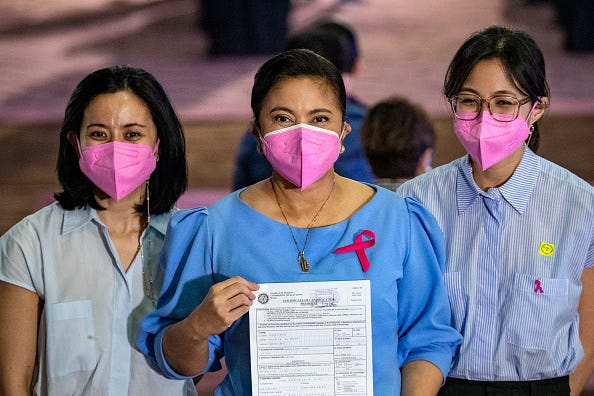"Democracy under siege." At first glance, Freedom House's 2021 report about the state of open societies, which carries this title, has a depressing takeaway. The Covid-19 pandemic, now in its third year, has accelerated many developments that help autocrats, like allowing heads of state to hold emergency powers. Around the world, the engineered proliferation of medical disinformation intersects with conspiracy theories and ideologies based on scapegoating.
Yet there is another story emerging, and it's one that may come into focus during the elections that will be held this year: the feeling that the autocratic model of governance, with its suppression of freedoms, plunder of the environment, and creation of oligarchies, is no longer sustainable. The costs of corrupt and uncaring leadership have never been clearer.
We'll look at some of the elections for head of state that are happening in spring 2022 and what they tell us about the strengths and weaknesses of autocracy today.
In April, Hungary's Viktor Orbán and Serbia's Aleksandar Vučić will stand for re-election. Hyper-nationalists who pose as guardians of "national tradition," both have domesticated the press, the judiciary, and other institutions to keep themselves in power. And both face a newly united opposition that hopes to unseat them.
Orbán's advantage as the incumbent is magnified by his system of electoral autocracy, where the electoral machinery, staffed by government loyalists, is tilted in favor of candidates with official backing. Yet six parties, including his former allies in the Jobbik party, have come together to try to defeat what coalition leader and opposition candidate Peter Marki-Zay calls a "corrupt dictatorship."

In Hungary, as elsewhere, the pandemic has caused economic hardship. The government is betting that tax rebates, pension and wage increases, and other relief measures will sway voters more than the opposition's promises to roll back autocratic abuses. Orbán is supporting Russia's aggression toward Ukraine so Putin will grant him enough natural gas to keep prices low.
That move may seem pragmatic, given the upcoming election, but it could backfire if the Russian invasion is as horrific as many expect it to be. Millions of Ukrainian refugees could stream toward Hungary (the two countries share an 84 mile border). Orbán may be the darling of the American GOP, but his future at home is uncertain.
Serbian President Vučić's hold on power has been weakened by a corruption scandal within his Serbian Progressive Party, and a previously divided opposition has come together over environmental advocacy. A campaign to block a foreign-owned lithium mine project has propelled thousands into the streets, blocking traffic for days.
Under pressure, Vučić has withdrawn his previously enthusiastic support of the project. Yet his persecution of the press and opposition politicians, who had boycotted the 2020 parliamentary elections, continues. "United, we can do it," said Marinika Tepic of United Serbia party, summing up the resolve his adversaries share.
Many Serbians, tired of the contrast between Vučić's bully personality and his constant claims of victimization by the press and his political enemies, are ready for some positivity in politics.
In May, Filipinos will elect a new head of state, since term limits are bringing Rodrigo Duterte's tumultuous presidency to an end. While the investigation by the Hague-based International Criminal Court into Duterte's use of extrajudicial violence in his war on drugs is on hold at the moment, the election will be a referendum on models of autocratic power in the country past and present.
Critics charge that Duterte has exploited his pandemic-era emergency powers to suppress freedom of speech (his loyalists shut down the ABS-CBN media network by not passing bills that would have granted it a new license). They also see his pandemic economic relief measures as benefitting big business and foreign investors, rather than the sick and the jobless.
Duterte will continue to influence Filipino politics. His daughter, Sara Duterte, is running for vice president on a ticket headed by Ferdinand "Bongbong" Marcos Jr., the son of the late dictator Ferdinand Marcos, who turned the Philippines into a kleptocracy. Marcos Jr. may appeal to many as a more palatable illiberal than the volatile Duterte, and nostalgia for Marcos Sr. has been on the rise.
The autocratic continuities represented by the Marcos-Duterte ticket have galvanized support for opposition candidates like Leni Robredo, a human rights lawyer and the current vice president. Her "pink revolution" has over 700,000 volunteers working in over 200 organizations.

Dictators can haunt their countries long after their demise. We will see if the Philippines follows this model or opts for a fresh start with a progressive candidate who is standing up for democracy.




The excesses and contradictions of corrupt regimes like Hungary's autocratic boss Victor Orbán's have unified the once splintered opposition parties into a formidable political opposition. I'll be watching! Likewise, in Israel not long ago, we saw how "Bibi" Netanyahu's, crimes and corruption united Israel's opposition parties into a ruling coalition that got rid of his strongman rule. I hope these are good examples that show how when resistance is focused and untied, liberal democratic change can be achieved by fed up populations, who aren't going to take it anymore!
What shall become of puppets who groak for strongman bones and headpats? I sure hope this growing feeling of hysteria, in Europe, and America, resolves well, and that people, in Hungary, and etc. see through these plastic puppets of, um, the Puppeteer. You bring hope and lucidity. Grazie!